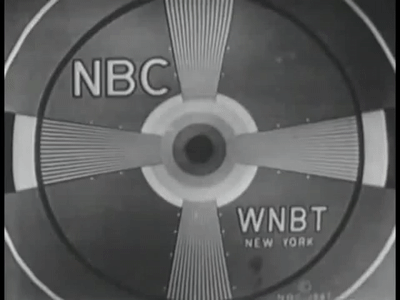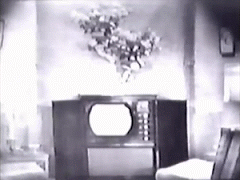So what exactly is that little symbol, anyway? A banana wrapped in some sort of tape? Auto-Lite must have been the sponsor of this thing, which MIGHT have been one of those shows that pre-famous actors acted in. In spite of all the rich programming in drama, it was considered a poor cousin and only a place for a screen actor to "start". That feeling still hangs in the air, maybe because of Netflix.
Tuesday, November 17, 2020
1948: Television's Year
Monday, November 16, 2020
FROM HELL IT CAME: Little Miss Echo (hello?)
Saturday, November 14, 2020
Smoking. . . unsmoking. . . smoking. . . unsmoking. . .
Friday, November 13, 2020
WAFFLING! (Trump falls over like a soggy waffle)
WAFFLING!
"Time will tell': Trump comes closest yet to admitting defeatUS President Donald Trump came close but stopped just short on Friday of acknowledging he lost the November 3 election to Democrat Joe Biden and said "time will tell."
"Ideally we won't go to a lockdown," he said. "I will not go. This administration will not be going to a lockdown.
"Hopefully, the, the whatever happens in the future, who knows which administration it will be, I guess time will tell but I can tell you this administration will not go to a lockdown," Trump said.
Trump then left the event in the White House Rose Garden without responding to reporters who were shouting questions such as, "When will you admit you lost the election, sir?"
US networks projected on Friday that Biden won the state of Georgia, giving him 306 votes in the Electoral College that determines the White House winner. Trump finished with 232.
Thursday, November 12, 2020
The circuit-breaker: how long can you hold your breath?
Wednesday, November 11, 2020
The NBC Peacock: best gif of all time!
Tuesday, November 10, 2020
HEIDI HELL: the doll that WAVES at you!
Monday, November 9, 2020
Bone music: x-ray records from Soviet Russia
From the late 1940s to the early 1960s, a subculture of young music lovers devised a way to sneak forbidden music around Soviet Russia by writing it directly onto old X-ray films. Adorned with images of skulls and bones, the discs were given names like "ribs" and roentgenizdat, and held within their grooves the sounds of Elvis Presley and Louis Armstrong.
"Jazz and rock 'n' roll were obviously censored because they were Western," British musician Stephen Coates tells Creators. "But a big chunk, probably most of it, was Russian music that was forbidden." Coates recently helped revitalized roentgenizdat after discovering a circular X-ray at a flea market in Saint Petersburg. The musician asked his Russian friends what it was, but they had no clue what he'd found. The seller even acted shady when Coates inquired more about it, but he purchased it anyway, brought the disc back to London, and eventually discovered it played Bill Haley's "Rock Around the Clock." "I was intrigued," he says, "and did more digging."
Coates found some information about the discs online and was eventually introduced to a Russian academic, who turned him onto The Golden Dog Gang, two young music lovers named Ruslan Bogoslowski and Boris Taigin who secretly used a record duplication machine to etch songs by the likes of Ella Fitzgerald and The Beatles onto discarded X-rays.
The Golden Dog Gang were caught selling the discs in 1950 and were thrown into the gulag until Stalin's death in 1953. When they got out, they got back to work, this time making more elaborately designed discs, until they were caught again and sent back to the prison for a few more years. Coates has since connected with some of the bootleggers, producing a documentary and book on the topic. (From Vice.com)
Saturday, November 7, 2020
Friday, November 6, 2020
Thursday, November 5, 2020
Tuesday, November 3, 2020
Monday, November 2, 2020
Mug shot: HAVE YOU SEEN THIS APE?
It's not Bigfoot, though if Bigfoot looked this scary I'd be crashing through the bush trying to get AWAY from it, not chase it to ground in order to capture grainy, indecipherable footage which would be analyzed frame-by-frame on the History Channel.
No, it's a reconstruction of Paranthropus Boisei, one of the earliest and most primitive human ancestors, with intimidating apelike faces and the upright bodies of hairy, stocky humans. You know - men.
BTW, this photo from an anthropological museum display has been mislabelled (by ME, including) as Orang Pendek, a Bigfoot variation from somewhere, oh who cares. They're all fakes anyway, except for THIS one. We know it's real. . . 'cause it's on Wiki.
Paranthropus boisei is a species of australopithecine from the Early Pleistocene of East Africa about 2.3 to 1.34 or 1 million years ago. The holotype specimen, OH 5, was discovered by palaeoanthropologist Mary Leakey in 1959, and described by her husband Louis a month later. It was originally placed into its own genus as "Zinjanthropus boisei", but is now relegated to Paranthropus along with other robust australopithecines. However, it is argued that Paranthropus is an invalid grouping and synonymous with Australopithecus, so the species is also often classified as Australopithecus boisei.(So's your old man.)
Sunday, November 1, 2020
Martin Scorsese, Martin Scorsese
A little Italian let’s praise today:
The Topo Gigio of pictures, let’s say.
When Taxi Driver comes on TV,
I always drop what I’m doing, you see,
For Travis Bickle is my main man,
Because of DeNiro I’m such a great fan.
When first I saw this story bleak,
I had to through my fingers peek,
For though the end was a gory mess,
I couldn’t stop watching, I must confess.
Who supports the Italian Munchkin party.
Like my Uncle Aubrey his eyebrows were dense,
And his movies didn’t always make much sense.
But to the soul they spoke without fail,
For Raging Bull's a morality tale.
And fluids red from DeNiro’s face
Went gushing and flying all over the place.
It filled us all with horror and dread.
But for our director, comedy was king,
For sociopaths were Marty’s favorite thing.
I can’t tell you all the movies he did,
For I’d be here all day, I do not kid.
But some of them were a big surprise,
Like Age of Innocence, pure sex in disguise.
And Alice by Bursteyn, my what a trick,
For feminist views he laid on quite thick.
And when he did that movie of Jesus,
He went far out of his way to please us.
Then there was Goodfellas, my what a pic,
And I can’t say it was my favorite flick.
Every time I try to watch this thing,
It doesn’t exactly make me sing.
And he and DeNiro seem joined at the hip.
It’s an odd sort of duo, a big guy and small,
With both of them Cosa Nostra and all.
Real genius is rare, so let's praise this guy,
And hope that his pic on Sinatra will fly.
His turkeys are few, though with Liza Minnelli
He went on a coke binge and turned into jelly.
Martin Scorsese, Martin
Scorsese,
Your pictures are great and drive film students crazy.
So some day I hope, in my brief mortal span
I can call you just Marty: cuz you is de man!




















































